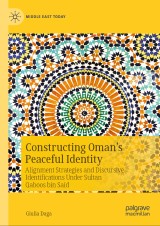Details
Constructing Oman's Peaceful Identity
Alignment Strategies and Discursive Identifications Under Sultan Qaboos bin SaidMiddle East Today
|
CHF 153.50 |
|
| Verlag: | Palgrave Macmillan |
| Format: | |
| Veröffentl.: | 27.08.2024 |
| ISBN/EAN: | 9783031624667 |
| Sprache: | englisch |
| Anzahl Seiten: | 216 |
Dieses eBook enthält ein Wasserzeichen.
Beschreibungen
<p>This book offers a comprehensive and insightful exploration of Oman’s discourses on foreign policy and national identity in the context of the Middle East. The Sultanate of Oman is often hailed as a peaceful exception in the region, but this work goes beyond surface-level observations to reveal the intricate complexities of Oman’s foreign policy and identity construction. With a keen focus on deconstructing essentialist understandings, the chapters delve into how discursive alignments and identity contents have shaped the government’s quest for legitimacy, recognition, and status. Employing a pioneering discourse historical approach to compare the National Day speeches and UN General Assembly speeches throughout Sultan Qaboos bin Said Al Bu Saidi’s reign (1970–2020), the author reveals how discourse evolved based on time, issues, and audiences. Notably, the book situates Oman within the context of the Gulf Cooperation Council states, examining how the Omani government’s interlinked discourses on identity and foreign policy contributed to differentiate the Sultanate from other Gulf countries. With chapters exploring Oman’s foreign policy principles, its material and ideological response to the ideas linked to the Dhofar Revolution, and its interactions with the Arab world and the international community, readers of this book will gain a comprehensive understanding of Oman’s evolving national and supranational identifications and the dynamic nature of its foreign policy. Challenging prevailing narratives while providing a fresh perspective on the relations between Oman’s foreign policy and identity construction, this book marks an important text for scholars as well as policymakers and anyone interested in understanding the intricate dynamics of Oman’s role in the global stage.</p>
<p>Chapter 1. Introduction and methodology.- Chapter 2. Representations of Oman’s (non)alignment strategies and national identity.- Chapter 3. Legitimising the Coup (1970-1976).- Chapter 4. Constructing Oman’s regional role.- Chapter 5. A twirling path towards ‘independence’ and ‘nonalignment’.- Chapter 6. Normative peace and religious tolerance.- Chapter 7. Branding Oman: an ongoing exercise.- Chapter 8. Conclusions.</p>
<p>Dr. Giulia Daga is a research fellow on the Gulf and the Middle East at the IAI (Istituto Affari Internazionali) and an adjunct lecturer in international relations of the Middle East. She received her Ph.D at the School of International Studies of the University of Trento in July 2023. During her doctoral program, she spent visiting time at the Sultan Qaboos University (Oman) and the LSE Middle East Centre (UK). Her main research interests include International Relations, History and Politics of Oman and the Arabian Peninsula; Maritime Strategy; Identity and Discourse Studies.</p>
<p> </p>
<p> </p>
This book offers a comprehensive and insightful exploration of Oman's foreign policy and national identity in the context of the Middle East. The Sultanate of Oman is often hailed as a peaceful exception in the region, but this work goes beyond surface-level observations to reveal the intricate complexities of Oman's foreign policy and identity construction.<p>With a keen focus on deconstructing essentialist understandings, the chapters delve into how discursive alignments and identity contents have shaped the government's quest for legitimacy, recognition, and status. Employing a pioneering discourse historical approach to compare the National Day speeches and UN General Assembly speeches throughout Sultan Qaboos bin Said Al Bu Saidi's reign (1970–2020), the author reveals how discourse evolved based on time, issues, and audiences.</p><p>Notably, the book situates Oman within the context of the Gulf Cooperation Council states, examining how Oman's identity and foreign policy differ from other Gulf nations. With chapters exploring Oman's foreign policy principles, its response to the historical coup and Dhofar Revolution, and its interactions with the Arab world and the international community, readers of this book will gain a comprehensive understanding of Oman's evolving identity and the dynamic nature of its foreign policy.</p><p></p><p>Challenging prevailing narratives while providing a fresh perspective on Oman's foreign policy and identity, this book marks an important text for scholars as well as policymakers and anyone interested in understanding the intricate dynamics of Oman's role in the global stage.</p><p><br></p><p>Dr. Giulia Daga is a research fellow on the Gulf and the Middle East at the IAI (Istituto Affari Internazionali) and an adjunct lecturer in international relations of the Middle East. She received her Ph.D at the School of International Studies of the University of Trento in July 2023. During her doctoral program, she spent visiting time atthe Sultan Qaboos University (Oman) and the LSE Middle East Centre (UK). Her main research interests include International Relations, History and Politics of Oman and the Arabian Peninsula; Maritime Strategy; Identity and Discourse Studies.<br></p><div><br></div><p><br></p>
Deconstructs essentialist understandings of Oman's identity and foreign policies Offers an innovative integration of discourse analysis and alignment strategies to its methodological framework Discusses small states’ alignments and Gulf Cooperation Council states’ foreign policies and identities
Diese Produkte könnten Sie auch interessieren:

Staat ohne Verantwortung?

von: Ludger Heidbrink, Alfred Hirsch, Simon Critchley, Pascal Delhom, Nancy Fraser, Volker Gerhardt, Christoph Hubig, Wolfgang Kersting, Helmut Klages, Tobias Nikolaus Klass, Werner Krawietz, Karl Heinz Ladeur, Renate Mayntz, Richard Münch, Julian Nida-Rümelin, Emmanuel Richter, Gunnar Folke Schuppert, Robert Spaemann, Werner Stegmaier, Michel Vanni

CHF 40.00

















